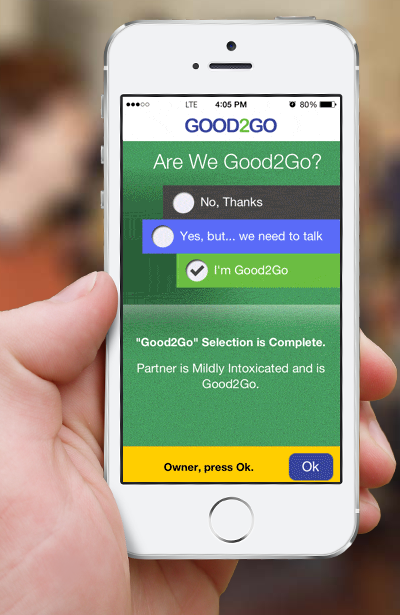The Independent's journalism is supported by our readers. When you purchase through links on our site, we may earn commission.
Good2Go: Proper sex and relationships education will help end assault, not an iPhone app
As ever with ‘rape avoidance’ technology, the proposed solution fails to respond to the actual problem

Developers in the US have created an app to tackle sexual assault on college campuses. It's called Good2Go, and it provides the user with a quick questionnaire that ascertains whether their partner is able to consent to sex by confirming how drunk or sober each party is. The creator, Lee Ann Allman, says it is designed to “help people make responsible choices”.
Horribly crass name aside, the potential problems of a sexual consent app are pretty clear.
For starters – who is this app aimed at? People who are worried about accidentally raping someone? This immediately upholds the myth that rape is something that “just happens”, as opposed to a deliberate act of coercion and violence that one person commits against another. Rape doesn’t happen by accident. And at what point during the night would you whip out your iPhone and ask your date to gauge whether they are “intoxicated but Good2Go” or “pretty wasted”?
It’s also concerning to wonder what might happen if someone used the app to agree to sex, and then changed their mind? If such a case went to court, would the perpetrator be able to point to the app to ‘prove’ consent? Would virtual consent before the act be legally binding? We know all too well how abysmal the conviction rate for rape is. In cases where victims have consented to sex once, and have not consented on a subsequent occasion, an app that can be used to ‘prove’ consent was given at one point could be very harmful.
And what happens if a partner uses the app to put pressure on someone to say that they feel fine, they’re not that drunk?
As ever with ‘rape avoidance’ technology, the proposed solution fails to respond to the actual problem. And that problem is a lack of understanding of – and respect for – mutual and enthusiastic consent. The solution to that problem is not an app on your mobile phone.

For years now, campaigners have argued that one of the key ways to tackle rape and sexual violence is education. Young people need comprehensive Sex and Relationships Education (SRE) that teaches them about respect within sexual relationships. We believe that by teaching young people about respect and consent, more can be done to tackle violence and abusive behaviour. We can do more to ensure young people do not feel pressured into having sex they don’t want, and feel confident about negotiating any sexual activity they are comfortable with. Further, teaching young people about consent and respect helps to tackle victim-blaming myths that treat women as responsible for presenting any violence committed against them.
To be clear - this is not about encouraging young people to have sex. In fact, there is no evidence to suggest that providing sex education increases underage sexual activity. Instead, it is about giving all young people the tools they need to build healthy sexual relationships when they choose to.
However, the Government remains incredibly resistant to this plan. In fact, earlier this year the House of Lords roundly rejected a bill that would have brought in mandatory SRE. As a result, sex education in the UK remains patchy - with individual schools choosing whether to teach basic biology, or to provide students with a wider understanding of sex, sexuality and relationships.
The problems that arise from not giving young people the tools to negotiate sex and relationships are visible all around us. Because the truth is, we are experiencing an epidemic of male violence against women - and it’s an epidemic that starts in the schoolroom. Research published in 2009 by the NSPCC and Bristol University found that one in three female respondents aged 13-17 had experienced some form of sexual violence. Research conducted by the NUS has reported that one in sex female students have experienced sexual assault or physical violence. Across the UK, over 400,000 women are sexually assaulted every year and 85,000 are raped. Meanwhile, research from the End Violence Against Women Coalition found that nearly one in three girls reported sexual harassment such as groping in the classroom.
Of course, compulsory SRE won’t end all incidents of sexual violence. But it’s not rocket science: if we teach young people that enthusiastic consent – a yes means yes - is a must for sex, if we teach them that an absence of ‘no’ isn’t the presence of a ‘yes’, if we teach them that they can have a voice to express what they do and don’t want out of sex, if we teach young people to respect bodily autonomy and integrity – then they won’t need an app. They’ll know that if their partner is incapacitated by alcohol that consent can’t be given. They’ll know that violating another person’s bodily autonomy is a crime.
Last week, the End Violence Against Women Coalition and the Everyday Sexism Project launched a petition to bring compulsory SRE into schools. Let’s hope that this time, our political leaders listen.
Otherwise, what’s the alternative? Surely we can do better than an app.
Join our commenting forum
Join thought-provoking conversations, follow other Independent readers and see their replies
Comments